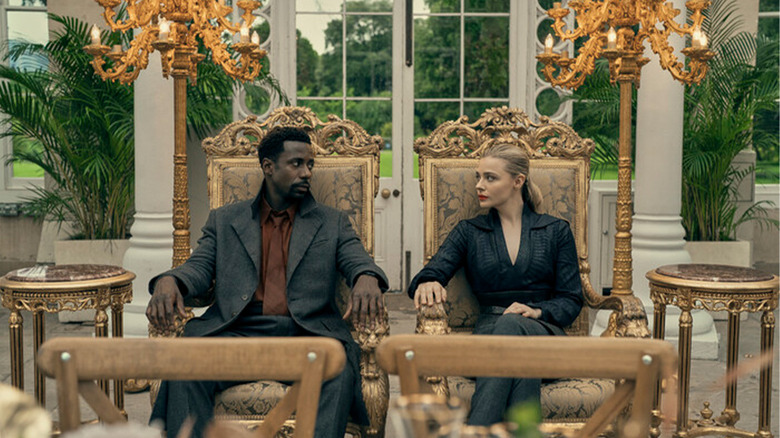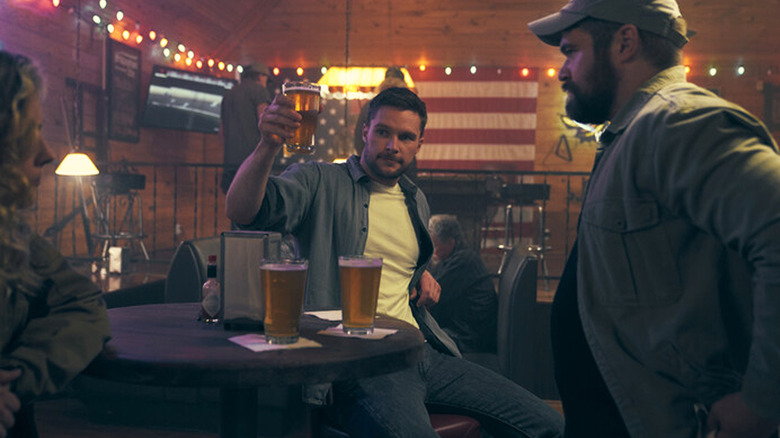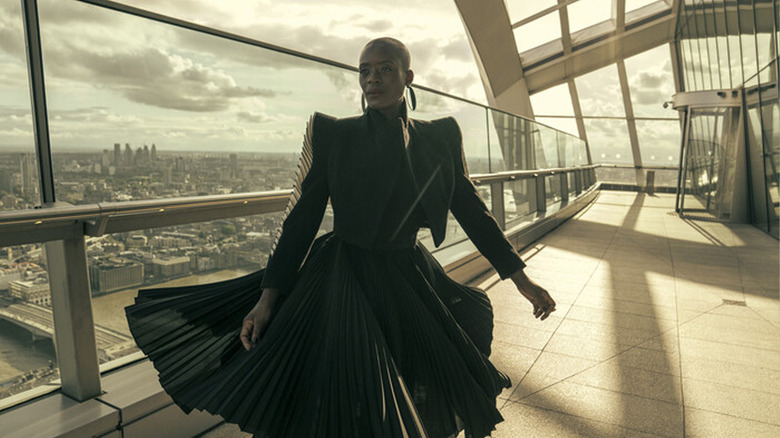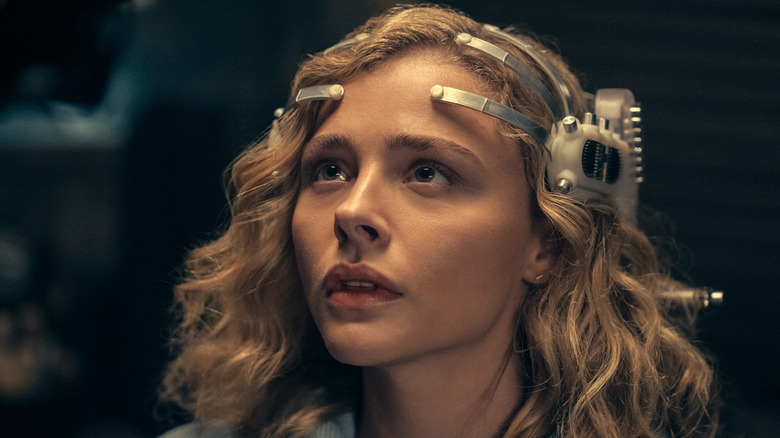The Peripheral Review: The Splashy New Prime Video Sci-Fi Series Is A Swing And A Miss
Part-way through Prime Video's new series "The Peripheral," I found myself wondering "is this real life?" — but not for the intended reasons. The new sci-fi drama series, which is executive produced by "Westworld" creators Jonathan Nolan and Lisa Joy, is a bold attempt at crafting an intriguing, thrilling new series. Like Nolan and Joy's HBO series, "The Peripheral" takes place in a future setting and deals with themes of identity, class, and personal responsibility. Both series lean heavily on impressive special effects, creating breath-taking visuals that give their world-building a distinct, grandeur aesthetic. Unlike the first season of "Westworld," however, "The Peripheral" is pretty darn boring right out of the gate.
Set in the year 2032 — approximately a decade from now — "The Peripheral" centers on a small-town, blue-collar brother and sister who find themselves involved in a high-stakes plot unlike anything they could have imagined. Flynne Fisher (Chloe Grace Moretz) is your average girl-next-door 20-something, who's stuck in her hometown in the Blue Ridge Mountains, eking out a meager living while taking care of her sick mom. Her brother Burton (Jack Reynor) lives in a trailer on the property, and while he is obviously well-intentioned and cares deeply for the women in his life, it's clear that he has his own demons to contend with. In order to pay for their mother's ever-increasing medical bills, the siblings earn extra money via virtual reality (VR) gaming. When a mysterious client offers Burton a significant payday to test an experimental system, he's all too happy to comply — with his sister, the better gamer, "jockeying" his avatar.
The two soon discover, however, that the events of this "virtual reality" are all too real. (Cue dramatic music.)
So much promise, so little success
The big twist in "The Peripheral" is that Flynne isn't in a hyper-realistic game — she's piloting an android ... in the future. Now, you may be thinking, "Sarah, why would you spoil this?" Well, let me tell you, dear reader, this actually isn't a spoiler. It's laid out in the official show synopsis. (It's also very obvious since the first scene, which takes place in the year 2099, is blatantly the same location that Burton's "avatar" is sent to.) The problem is, the show's plot unfolds like this is a big reveal, and that's a pattern that continues throughout the six episodes provided for review. The stakes are tied to Flynne's perspective and experiences, yet the audience is constantly given information that Flynne doesn't have — which completely undermines any potential intrigue or suspense, and makes the watching experience dreadfully dull.
Compounding the clumsy structure in "The Peripheral" is general bloat. There's a large, colorful cast of characters in "The Peripheral" — emphasis on large. Flynne and Burton interact with a number of people from their rural community — far too many to list here — and then there's another assortment of figures in the future setting. As the season progresses, more and more competing storylines and motivations get introduced, only further muddying the plot. There's Corbell Pickett (Louis Herthum), the local crime boss who poses a threat to the Fisher family.
At odds with Corbell is the local police officer Tommy Constantine (Alex Hernadez), who happens to be Flynne's childhood friend and unrequited love interest. Tommy and Corbell get drawn into future-tech shenanigans too, and they each have their own circles of people they interact with onscreen — and that's not even getting into Burton's ex-marine buddies, Flynne's coworkers, or the mercenaries hired by people in the future. It's too many people, with insufficient characterization to be relatable or compelling, unclear motivation, and not enough narrative significance to justify their scenes.
Ready Player One Redux
"The Peripheral" has all the right ingredients for a hit sci-fi thriller, but the recipe sucks.
There are elements of the series that work really well. Disabled marine veteran Connor (played by Eli Goree) has an interesting backstory, and the actor has great chemistry with Moretz and Reynor. The performances are mostly fine; one gets a sense that Herthum is having a lot of fun in the role of the despicable yet charismatic Corbell. And the special effects are lovely. The world of is rich and interesting, and the future scenes (pictured above) are a visual treat. I particularly like the grand, titan-esque buildings that dot the skyline of London circa 2099 — fashioned after Classical sculptures, they are impossibly tall, making the sky scrappers around the look like mere toys. There's something just a bit uncanny about this world, and that adds to the suspense.
At the same time, some of the visual choices in "The Peripheral" really hurt the series. A major issue is the setting: we're told the events are happening a decade from now, but the technology and infrastructure seem so far removed from our current reality that it breaks believability. Sure, the idea of a small town using 3D printer technology for everyday goods is somewhat feasible, but it's hard to imagine that being normalized any time soon. Similarly, Flynne operates an old, beat-up ATM that uses hand-scan recognition — not something common today. And remember, this is a small, impoverished community. So when was this ATM installed, and why is it so beat up? I know this sounds like a Cinemasins-worthy nit-pick, and maybe it is — but to me, it demonstrates the lack of attention to detail that plagues "The Peripheral."
Nothing to write home about
"The Peripheral" is simultaneously too much and not enough. There are too many characters, too many scenes, and too many storylines. We are given too much information: the quiet part is often yelled out loud, and as a result, nothing comes as a surprise. And yet, we aren't given enough to actually care about these people. The stakes have no weight. Apart from Connor, Flynne, and Burton, I don't know enough about any of the characters to feel invested in their stories. The action sequences are neat, but without concern for the people involved, even the most well-choreographed fight sequences will fall flat (and the sequences in the Prime Video series are, viewed in isolation, unspectacular).
I was all for this series going in. Is the premise a bit tired? Sure. Have Nolan and Joy disappointed us before? Definitely. But despite all that, "The Peripheral" had enough going for it that I was genuinely excited to watch my screeners. Sadly, that enthusiasm quickly faded and was replaced by dread — after episode 2, I was bored, and I never would have spent my precious, kid-free spare time watching it if I had known what I was getting into.
"The Peripheral" hits Prime Video on October 21, 2022.



